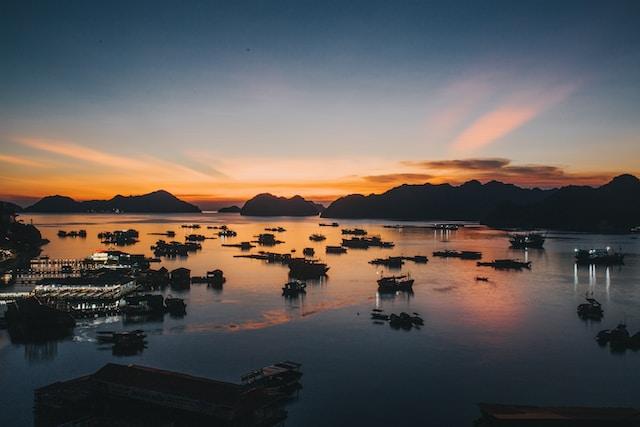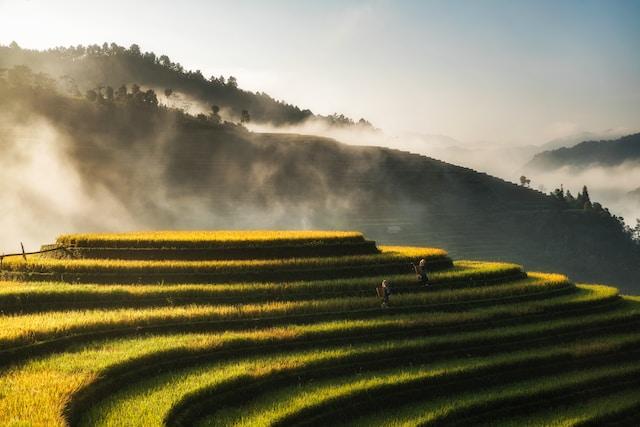Vietnam, a vibrant Southeast Asian gem, is a country that offers a rich tapestry of history, culture, natural beauty, and mouthwatering cuisine. Whether you’re planning a relaxing beach vacation, an adventure-packed trip, or a cultural immersion, Vietnam has something for everyone. However, to make the most of your visit and ensure a seamless experience, it’s essential to plan and prepare your Vietnam trip in advance.
Important Travel Tips for your Vietnam Trip
Research and Planning
1. Best Time to Visit
Vietnam experiences diverse climates, so it’s important to choose the best time to visit based on your preferred activities and weather preferences. The country can be divided into three regions: North, Central, and South, each with its own distinct weather patterns. Generally, the best time to visit is during the spring (March to April) and autumn (September to November) when the weather is milder and more pleasant. Check our list of Festivals happening around the year in Vietnam, maybe you’ll find one that coincides with your travel plans!
2. Duration of Stay
Consider how much time you have available for your trip, as Vietnam offers a myriad of attractions and experiences. Whether you have a week or a month, plan your itinerary accordingly. It’s important to strike a balance between exploring different regions and allowing enough time to immerse yourself in the local culture.
3. Visa Requirements
Most visitors to Vietnam require a visa. Research the specific visa requirements based on your nationality and the duration of your stay. Apply for your visa well in advance to avoid any last-minute hassles. You can obtain a visa through the Vietnamese Embassy or Consulate in your home country or apply for an e-visa or visa on arrival, depending on your eligibility.
4. Travel Insurance
It is highly recommended to purchase travel insurance that covers medical emergencies, trip cancellations, and lost belongings. Ensure that your insurance policy provides coverage for activities you plan to engage in during your trip. Read the terms and conditions carefully and keep a copy of your insurance policy and emergency contact information with you.
5. Vaccinations and Health Considerations
Consult your healthcare provider or travel clinic to ensure you are up to date on routine vaccinations and to receive any recommended vaccines for travel to Vietnam. Common vaccinations for Vietnam include hepatitis A and B, typhoid, tetanus, diphtheria, and Japanese encephalitis. Also, consider health precautions, such as using mosquito repellent to prevent mosquito-borne illnesses like dengue fever or malaria. It’s a good idea to grab some from Amazon before your trip!
Creating an Itinerary
1. Must-See Destinations
Vietnam boasts numerous captivating destinations, each offering its unique charm. Consider including Hanoi, the bustling capital, known for its historic sites and vibrant street life. Ho Chi Minh City or Saigon is another must-visit, offering a blend of modernity and history. Halong Bay, with its stunning limestone karsts, and the ancient town of Hoi An are also popular choices. Don’t miss out on Da Nang, Hue, Sapa, and the Mekong Delta for a complete Vietnam experience.
2. Transportation Options
Understand the various transportation modes available in Vietnam to help you navigate the country efficiently. Domestic flights are a convenient option for long distances, while trains and buses provide affordable and scenic journeys. Boats and ferries are essential for exploring the islands and waterways. Consider the duration, cost, and comfort level when selecting your transportation options.
3. Accommodation Choices
Vietnam offers a wide range of accommodations to suit every budget and preference. From luxury resorts to budget-friendly hostels and homestays, you’ll find plenty of options. Research and book your accommodations in advance to secure the best deals and availability, especially during peak tourist seasons. This will definately save you a lot of unnecesary headache on you Vietnam Trip.
4. Budgeting and Currency
Determine your budget for the trip and allocate funds for accommodation, transportation, meals, activities, and souvenirs. Vietnam is generally an affordable destination, but prices can vary depending on the region and the level of luxury you seek. Familiarize yourself with the Vietnamese Dong (VND), the local currency, and be prepared to use cash for many transactions. ATMs are widely available, and credit cards are accepted in larger establishments, but it’s always advisable to carry some cash for smaller vendors and markets.
Cultural Etiquette and Customs

1. Understanding Vietnamese Culture
Familiarize yourself with Vietnamese culture to show respect and appreciation during your visit. The Vietnamese people value family, respect for elders, and harmonious relationships. Buddhism is the dominant religion, followed by Confucianism and Taoism, which influence the culture and traditions of the country.
2. Language Basics
While English is spoken in tourist areas, learning a few basic Vietnamese phrases will go a long way in showing respect and making connections with the locals. Simple greetings, “hello” (xin chào), “thank you” (cám ơn), and “goodbye” (tạm biệt), will be appreciated. Check out our blog on the Vietnamese Language if you want to learn more about the local culture.
3. Dress Code and Respectful Behavior
Vietnam is a conservative country, especially outside major cities. Dress modestly and respectfully when visiting temples, pagodas, or rural areas. Cover your shoulders and knees, and remove your shoes when entering religious sites. Avoid public displays of affection and be mindful of local customs and traditions.
4. Tipping and Bargaining
Tipping is not customary in Vietnam, but it’s becoming more common in tourist areas. In restaurants, rounding up the bill or leaving a small tip is appreciated. Bargaining is also common in markets and smaller shops, so be prepared to negotiate prices, but always do so respectfully and with a smile.
Packing Essentials
1. Clothing and Footwear
Pack lightweight and breathable clothing suitable for the tropical climate. Include comfortable walking shoes,Walking Sandals” target=”_blank” rel=”noreferrer noopener”> sandals, and a pair of sturdy footwear if you plan to trek or explore rural areas. Don’t forget a hat, sunglasses, and a rain jacket or umbrella for unexpected weather changes. We’ve added some great options from Amazon in the words linked for you to consider bringing along for your Vietnam trip.
2. Weather Considerations
Vietnam experiences different weather patterns throughout the year. Check the weather forecast for your travel dates and pack accordingly. Be prepared for heat and humidity in the summer, cooler temperatures in the north during winter, and potential rainfall during the rainy season.
3. Travel Documents and Essentials
Ensure you have all necessary travel documents, including your passport with at least six months validity, visa (if required), flight tickets, and hotel reservations. Keep digital and physical copies of important documents in case of loss or theft. Don’t forget essentials like travel adapters, a reusable water bottle, and a travel lock.
4. Electronics and Adapters
Vietnam uses 220V electrical outlets, so check if you need a voltage converter or an adapter for your electronics. It’s handy to carry a power bank for charging devices on the go. The All-In-One Plug is the best option we’ve found so far, ensuring both safety and long-lasing usage.
5. Medications and First Aid
Pack any prescription medications you require, along with a basic first aid kit. Include essentials like pain relievers, diarrhoea medication, antihistamines, and any specific medications you may need. Also, carry mosquito repellent, and Broad Spectrum SPF50++ suncream to protect your skin from UV rays.
Staying Connected

1. Mobile Connectivity
Check with your mobile service provider about international roaming options. Alternatively, you can purchase a local SIM card upon arrival at the airport or in major cities. Make sure your phone is unlocked and compatible with the local network.
2. Wi-Fi Availability
Wi-Fi is widely available in hotels, cafes, restaurants, and tourist areas. However, the quality and reliability may vary. If you need constant internet access, consider getting a Portable wifi device or using mobile data with a local SIM card. Portable Wi-Fi devices are particularly useful if you plan on engaging in activities in more secluded regions.
Money Matters
1. Currency Exchange
Exchange your currency to Vietnamese Dong upon arrival at the airport or in major cities. Banks and authorized exchange offices offer better rates than hotels or street vendors. Be cautious when using small currency exchange services and always count your money before leaving.
2. ATMs and Credit Cards
ATMs are prevalent throughout Vietnam, especially in major cities and tourist areas. Credit cards are accepted in larger establishments, but it’s advisable to carry cash for smaller vendors and markets. Inform your bank about your travel plans to avoid any issues with your cards.
3. Budgeting Tips
Vietnam is generally an affordable destination, but costs can vary depending on your travel style. Street food and local eateries offer inexpensive dining options, while upscale restaurants can be pricier. Consider a mix of street food, local restaurants, and occasional splurges to balance your budget.
Health and Safety

1. Travel Insurance
Purchase comprehensive travel insurance that covers medical emergencies, trip cancellations, and lost belongings. Read the policy carefully, understand the coverage, and keep a copy of the insurance details with you.
2. Vaccinations and Medications
Consult your healthcare provider or travel clinic to ensure you are up to date on routine vaccinations and to receive any recommended vaccines for Vietnam. Consider vaccinations for hepatitis A and B, typhoid, tetanus, diphtheria, and Japanese encephalitis, depending on your travel plans and medical history.
3. Food and Water Safety
To avoid foodborne illnesses, opt for hot, freshly cooked meals and avoid raw or undercooked food. Drink bottled or boiled water and use it for brushing your teeth (if you have a sensitive stomach). Be cautious of street food hygiene, and choose vendors with high turnover and a clean cooking environment.
4. Local Laws and Customs
Familiarize yourself with the local laws and customs to ensure a safe and respectful experience. Respect religious sites and traditions, and be mindful of local regulations. Avoid illegal drugs and any activities that may be considered disrespectful or offensive.
5. Emergency Contacts
Save emergency contact numbers, including the local police and hospital, in your phone or on a piece of paper. In case of an emergency, reach out to the nearest embassy or consulate of your home country.
Transportation in Vietnam
1. Air Travel
Vietnam has several domestic airports, offering convenient connections between major cities and popular tourist destinations. Domestic airlines are reliable and offer competitive fares. Book flights in advance for better deals.
2. Public Transportation
Vietnam has an extensive public transportation network, including trains and buses. Trains are a comfortable and scenic option for long distances, while buses are more budget-friendly and cover a wider range of destinations. Be prepared for longer travel times on buses due to traffic conditions.
3. Taxis and Ride-Hailing Services
Taxis are widely available in cities, and reputable companies include Mai Linh, Vinasun, and Grab. Use only metered taxis or negotiate the fare upfront. Ride-hailing services like Grab are popular and convenient, offering fixed prices and a cashless payment option.
4. Renting a Motorbike
Renting a motorbike is a popular way to explore Vietnam, especially in rural areas. Ensure you have a valid international driver’s license, wear a helmet, and exercise caution on the roads. Familiarize yourself with local traffic rules and consider your riding experience before opting for this mode of transportation.
5. Navigating Traffic
Traffic in Vietnam can be chaotic, especially in big cities. Pedestrians should exercise caution when crossing the road and follow the lead of locals. Look for gaps in the traffic, walk at a steady pace, and drivers will manoeuvre around you. Consider using pedestrian bridges or crossings where available.
Immersion in Local Cuisine
1. Must-Try Vietnamese Dishes
Vietnamese cuisine is renowned for its fresh flavours and vibrant street food culture. Don’t miss iconic dishes like phở (noodle soup), bánh mì (Vietnamese sandwich), gỏi cuốn (fresh spring rolls), and bún chả (grilled pork with noodles). Explore local markets and street stalls to discover new flavours and regional specialities.
2. Street Food Safety
Street food is an integral part of the Vietnamese culinary experience. To ensure food safety, choose stalls with a high turnover of customers and observe food preparation practices. Opt for cooked-to-order dishes and avoid raw or uncooked food. Use your judgment and follow the locals’ lead when selecting street food vendors.
3. Dining Etiquette
When dining in restaurants, it’s customary to share dishes with others at the table. Use chopsticks for noodles and rice dishes, and a spoon for soups. Practice patience and allow the host or eldest person to begin eating before you start. If invited to someone’s home, remove your shoes before entering and bring a small gift as a token of appreciation. Check our full guide on Vietnamese dining etiquette for more information!
Embracing Vietnamese Culture

1. Historical Sites and Museums
Vietnam has a rich history, and exploring historical sites and museums is a great way to learn about the country’s past. Visit the Imperial City of Hue, the Cu Chi Tunnels near Ho Chi Minh City, and the War Remnants Museum to gain deeper insights into Vietnam’s history and the Vietnam War.
2. Temples and Pagodas
Vietnam is dotted with beautiful temples and pagodas, showcasing the country’s religious and spiritual traditions. Explore iconic sites like the Temple of Literature in Hanoi, the Perfume Pagoda near Hanoi, and the Jade Emperor Pagoda in Ho Chi Minh City.
3. Festivals and Celebrations
If your trip coincides with a local festival or celebration, take the opportunity to immerse yourself in the vibrant culture and traditions. Festivals like Tet (Lunar New Year), Mid-Autumn Festival, and the Lantern Festival offer a glimpse into Vietnamese customs, music, dance, and food.
Tips for a Memorable Trip
- Pack a Sense of Adventure: Vietnam offers a mix of bustling cities, serene landscapes, and unique experiences. Embrace the unfamiliar, try new foods, interact with locals, and be open to spontaneous adventures. The country’s beauty lies in its diversity and surprises.
- Interact with Locals: Vietnamese people are friendly and hospitable. Engage in conversations, ask for recommendations, and learn about their customs and traditions. Tap the link for some words that you may find useful. Interacting with locals will enhance your understanding of Vietnam and create memorable experiences. Feel free to learn some Vietnamese proverbs to impress the crowds!
- Embrace the Unexpected: Travelling in a foreign country can sometimes bring unexpected situations or challenges. Embrace them with a positive attitude and be flexible in your plans. Embracing the unexpected can lead to remarkable experiences and create lasting memories.
Preparing for a trip to Vietnam requires careful planning and research to ensure a smooth and enjoyable journey. By considering factors like the best time to visit, creating a well-thought-out itinerary, respecting local customs, and packing appropriately, you’ll be well-prepared to immerse yourself in the vibrant culture, explore breathtaking landscapes, and savour the delicious cuisine that Vietnam has to offer. With this comprehensive guide, you’re ready to embark on an unforgettable adventure in Vietnam.

